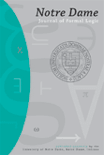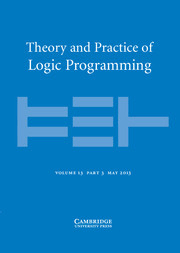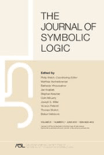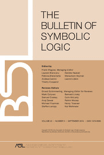
Reports on Mathematical Logic
Scope & Guideline
Bridging Theory and Practice in Mathematical Logic
Introduction
Aims and Scopes
- Formal Logic and Proof Theory:
The journal emphasizes rigorous formal approaches to logic, including proof systems and their applications, as demonstrated by works on tableau methods and formal theorems. - Model Theory:
Research in model theory, particularly related to infinite structures and definability, is a core area, as seen in discussions of models for potential infinity and ordered fields. - Set Theory and Cardinal Characteristics:
Exploration of set-theoretic properties, including cardinal characteristics and the implications of the generalized continuum hypothesis (GCH), indicates a strong focus on foundational aspects of set theory. - Algebraic Logic:
The intersection of logic and algebra, including studies on infinitary algebras and projective planes, showcases the journal's commitment to exploring algebraic structures within logical frameworks. - Decidability and Computational Aspects:
The journal addresses decidability issues in various logical contexts, highlighting the computational implications of logical theories.
Trending and Emerging
- Modal Logic and Tableau Methods:
The increasing focus on tableau approaches for modal and contact logics indicates a trend towards enhancing computational methods in logical reasoning. - Advanced Model Theory:
Emerging themes in advanced model theory, particularly regarding potential infinity and definability, highlight a growing interest in deeper theoretical explorations. - Interdisciplinary Approaches:
There is a noticeable trend towards interdisciplinary research that integrates algebraic methods with logical analysis, as seen in studies of projective planes and infinitary algebras. - Quantitative Aspects of Logic:
Recent works addressing cardinal characteristics and their implications suggest a rising interest in the quantitative dimensions of logic, linking it with set-theoretic properties. - Computational Decidability:
The journal is increasingly publishing works that investigate decidability in various logical contexts, reflecting a trend towards understanding the computational boundaries of logical theories.
Declining or Waning
- Classical Logic Applications:
There seems to be a decline in publications focused on classical forms of logic, with a shift towards more specialized and advanced topics like modal logic and algebraic structures. - Basic Set Theory:
Previous interests in foundational set theory concepts may be waning as the journal increasingly tackles more advanced and nuanced aspects of set-theoretic logic. - Elementary Logic Frameworks:
The exploration of elementary logic frameworks appears to be less prevalent, possibly overshadowed by more complex logical systems and their applications.
Similar Journals

Algebra and Logic
Advancing Knowledge in Algebra and Logic.Algebra and Logic is a prestigious journal published by Springer, focusing on the intricate fields of algebra, number theory, analysis, and logic. With a history spanning over five decades since its inception in 1968, the journal serves as a critical platform for scholars and practitioners to disseminate cutting-edge research, theoretical advancements, and practical applications within these mathematical domains. Notably, it holds a distinguished Q2 ranking in its categories for 2023, reflecting its impact and relevance in the academic landscape. Though the journal does not currently offer open access options, its rigorous peer-review process ensures the highest standards of scholarly integrity and quality. Additionally, its Scopus rankings further underline its significance, with placements in the competitive percentiles in various subfields. Algebra and Logic is essential reading for anyone involved in mathematical research, providing invaluable insights and fostering dialogue among researchers, professionals, and students alike.

Pure and Applied Mathematics Quarterly
Connecting Mathematicians Through Quality ResearchPure and Applied Mathematics Quarterly is a prestigious journal published by INT PRESS BOSTON, INC, focusing on the diverse and evolving field of mathematics. Since its inception in 2007, this journal has grown significantly, currently holding a Q1 ranking in the Mathematics (Miscellaneous) category for 2023, positioning it among the leading publications in the discipline. With a commitment to publishing high-quality research, Pure and Applied Mathematics Quarterly fosters innovation and dialogue within the mathematical community by providing a platform for theoretical advancements and practical applications. The journal remains accessible to researchers and professionals through its ISSN 1558-8599 and E-ISSN 1558-8602, although it does not currently offer open access. As a vital resource for mathematicians, educators, and students, this journal endeavors to expand the frontiers of mathematical knowledge and contribute to the academic dialogue surrounding this fundamental science.

Notre Dame Journal of Formal Logic
Innovating Thought in Logical Studies Since 1960Notre Dame Journal of Formal Logic is a premier academic publication dedicated to the advancement of research in the field of logical studies. Published by DUKE UNIVERSITY PRESS, this journal has been a significant contributor to the discipline since its inception in 1960, with an impressive convergence of scholarly articles expected to continue through 2024. With its focus on rigorous formal logic, the journal plays a crucial role in fostering discussions that bridge mathematics and philosophical inquiry, holding a notable Q2 ranking in the 2023 Logic category. Despite its non-open-access status, the journal reaches a wide audience of researchers, professionals, and students committed to exploring the foundational aspects of logics. Located in Durham, NC, it provides a platform for innovative thought and critical engagement within the logic community. With its impactful contributions, the Notre Dame Journal of Formal Logic stands as a vital resource for those seeking to deepen their understanding of both classic and contemporary logical theories.

Studia Logica
Illuminating the Path of Logical InquiryStudia Logica is a leading international journal published by Springer that focuses on the intricate interconnections between logic, philosophy, and the history of science. Established in 1953, this journal has garnered an esteemed reputation, consistently appearing in the Q1 category for History and Philosophy of Science and Q2 for Logic in 2023. With a robust Scopus ranking, where it stands at #42 out of 223 in the field of Arts and Humanities and #17 out of 41 in Mathematics (Logic), Studia Logica is pivotal for researchers and scholars keen on exploring the foundations and implications of logical theory and its applications. The journal does not follow an open access model, ensuring that the published work maintains a high standard of quality and rigor. Located in Dordrecht, Netherlands, the journal continues to be a crucial conduit for advancing scholarly discourse and disseminating cutting-edge research in its respective fields.

THEORY AND PRACTICE OF LOGIC PROGRAMMING
Advancing the Frontiers of Logic Programming.THEORY AND PRACTICE OF LOGIC PROGRAMMING, published by Cambridge University Press, is a premier academic journal that delves into the evolving field of logic programming, offering insights and advancements from 2001 to 2024. With an ISSN of 1471-0684 and an E-ISSN of 1475-3081, this journal serves as a vital resource for researchers, professionals, and students interested in areas such as artificial intelligence, computational theory, and software development. In 2023, the journal was recognized for its excellence, achieving Q1 status in Computational Theory and Mathematics and Q2 in several other categories, underscoring its significant impact within the academic community. Despite not being open access, its robust content, curated by esteemed scholars, guarantees high-quality research and innovative methodologies that are crucial for advancing the field. The journal's rigorous peer-review process and its standings in Scopus rankings further emphasize its relevance and authority, making it a quintessential platform for disseminating key findings and fostering scholarly dialogue.

JOURNAL OF SYMBOLIC LOGIC
Exploring the Frontiers of Logic and PhilosophyThe JOURNAL OF SYMBOLIC LOGIC, published by Cambridge University Press, stands as a leading platform for scholarly discourse in the realms of logic and philosophy. With a rich history dating back to 1938, this esteemed journal is dedicated to presenting cutting-edge research that pushes the boundaries of knowledge within symbolic logic and its applications. In 2023, it proudly holds a distinguished Q1 ranking in both Logic and Philosophy categories, reflecting its high impact and relevance in the academic community. Researchers and academics benefit from its rigorous peer-review process and contributions from leading scholars worldwide, ensuring the dissemination of high-quality research and critical theories. While the journal currently does not operate under an open access model, it remains a pivotal resource for professionals seeking to deepen their understanding of logical theories and philosophical inquiries. Explore the JOURNAL OF SYMBOLIC LOGIC to engage with scholarly articles that challenge conventional thought and inspire future research.

ACTA INFORMATICA
Advancing Knowledge in Computer Science.ACTA INFORMATICA is a prestigious academic journal published by Springer, dedicated to advancing the fields of computer networks and communications, information systems, and software engineering. With an ISSN of 0001-5903 and an E-ISSN of 1432-0525, the journal has continued to thrive since its inception in 1971 and is set to cover research up until 2024. Although it currently operates within a Q3 category in its respective fields, it is recognized for providing a platform for high-quality, peer-reviewed research, which is essential for fostering innovation and knowledge dissemination in computer science. While it does not offer an open access option, scholars benefit from its rigorous editorial standards and comprehensive coverage of significant trends and methodologies. The journal is conveniently based in New York, NY, USA, further enhancing its accessibility to a global audience. Researchers, professionals, and students alike will find ACTA INFORMATICA a valuable resource for staying abreast of the latest developments and breakthroughs in this vital area of study.

Australasian Journal of Logic
Advancing the frontiers of logical thought.The Australasian Journal of Logic is a prominent scholarly publication in the field of logic, published by the Australasian Association for Logic. With an ISSN of 1448-5052, this journal serves as a vital platform for disseminating research that advances the understanding and application of logical theory and its intersection with various disciplines. Although it is not open access, its rigorously peer-reviewed articles cater to academics, researchers, and students keen on exploring contemporary issues in logic both in theoretical and practical domains. The journal aims to foster scholarly communication and collaboration within the logic community, encouraging the exchange of ideas and insights that shape the future of logical studies. By contributing to the growing body of knowledge in this essential field, the Australasian Journal of Logic plays a crucial role in enhancing the intellectual landscape of logic research.

BULLETIN OF SYMBOLIC LOGIC
Illuminating the Pathways of Logical InquiryBULLETIN OF SYMBOLIC LOGIC, published by Cambridge University Press, is a distinguished academic journal that serves as an essential platform for the dissemination of research in the realms of logic and philosophy. Since its inception in 1995, this journal has progressed through its convergence years and remains committed to fostering intellectual discourse among scholars. With a 2023 ranking in the Q1 category of Philosophy and a Q3 classification in Logic, it continues to uphold its reputation as a significant contributor to the field. While operating under a traditional subscription model, the journal dedicates itself to publishing high-quality articles that explore foundational issues, advanced theories, and innovative insights in symbolic logic. Researchers, professionals, and students will find invaluable resources within its pages, particularly as it ranks favorably among peers, with noteworthy standings in Scopus rankings. For those seeking to deepen their understanding of logical frameworks and their philosophical implications, BULLETIN OF SYMBOLIC LOGIC is an indispensable resource.

FUNDAMENTA MATHEMATICAE
Enriching the academic landscape with high-impact findings.FUNDAMENTA MATHEMATICAE is a distinguished journal in the realm of mathematics, focusing on algebra and number theory, published by the Polish Academy of Sciences, Institute of Mathematics - IMPAN. With a rich publication history dating back to the late 20th century, it serves as a vital platform for innovative research, fostering intellectual discourse among mathematicians globally. As a Q3 journal in the 2023 category for Algebra and Number Theory, it holds an essential place within the academic community, particularly noted for its contribution to advancing theoretical knowledge and practical applications in mathematics. Although it does not currently offer an open access model, the journal's commitment to quality and rigor ensures that the research disseminated is of high impact and relevance. It actively supports the scholarly pursuits of researchers, professionals, and students alike, making it an invaluable resource for those dedicated to the mathematical sciences.